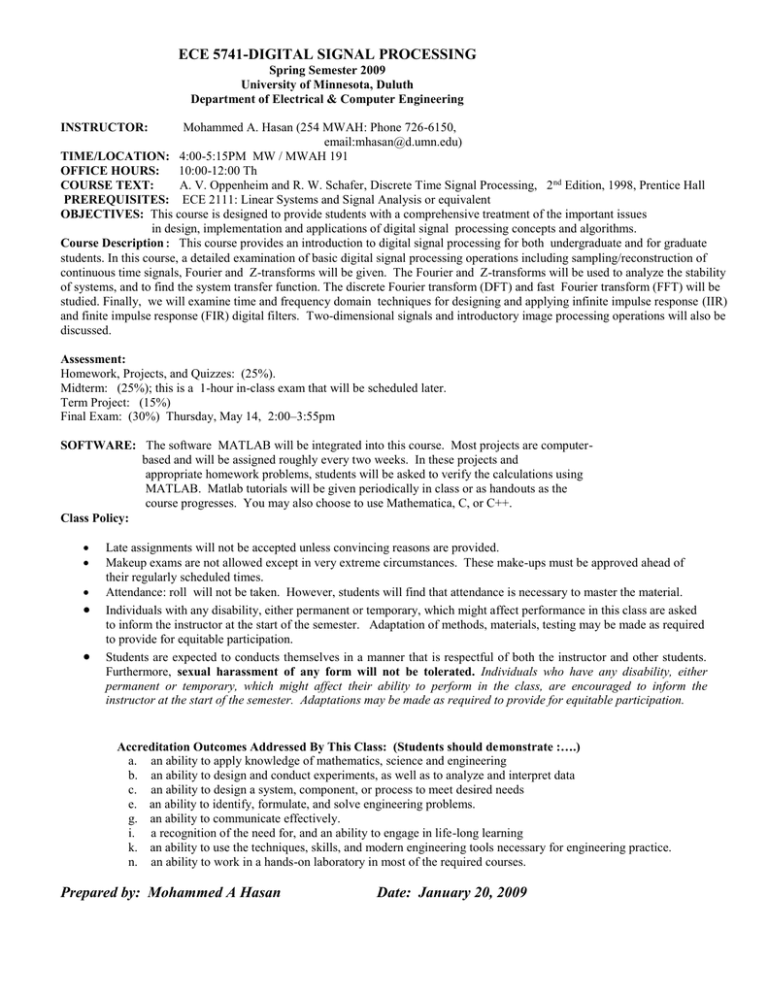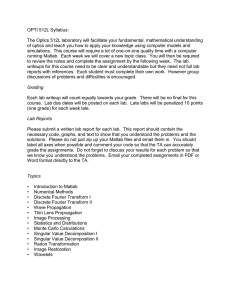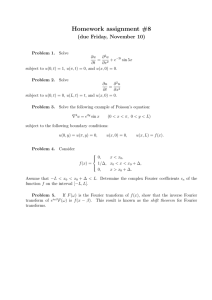ECE 5741-DIGITAL SIGNAL PROCESSING
advertisement

ECE 5741-DIGITAL SIGNAL PROCESSING Spring Semester 2009 University of Minnesota, Duluth Department of Electrical & Computer Engineering INSTRUCTOR: Mohammed A. Hasan (254 MWAH: Phone 726-6150, email:mhasan@d.umn.edu) TIME/LOCATION: 4:00-5:15PM MW / MWAH 191 OFFICE HOURS: 10:00-12:00 Th COURSE TEXT: A. V. Oppenheim and R. W. Schafer, Discrete Time Signal Processing, 2 nd Edition, 1998, Prentice Hall PREREQUISITES: ECE 2111: Linear Systems and Signal Analysis or equivalent OBJECTIVES: This course is designed to provide students with a comprehensive treatment of the important issues in design, implementation and applications of digital signal processing concepts and algorithms. Course Description: This course provides an introduction to digital signal processing for both undergraduate and for graduate students. In this course, a detailed examination of basic digital signal processing operations including sampling/reconstruction of continuous time signals, Fourier and Z-transforms will be given. The Fourier and Z-transforms will be used to analyze the stability of systems, and to find the system transfer function. The discrete Fourier transform (DFT) and fast Fourier transform (FFT) will be studied. Finally, we will examine time and frequency domain techniques for designing and applying infinite impulse response (IIR) and finite impulse response (FIR) digital filters. Two-dimensional signals and introductory image processing operations will also be discussed. Assessment: Homework, Projects, and Quizzes: (25%). Midterm: (25%); this is a 1-hour in-class exam that will be scheduled later. Term Project: (15%) Final Exam: (30%) Thursday, May 14, 2:00–3:55pm SOFTWARE: The software MATLAB will be integrated into this course. Most projects are computerbased and will be assigned roughly every two weeks. In these projects and appropriate homework problems, students will be asked to verify the calculations using MATLAB. Matlab tutorials will be given periodically in class or as handouts as the course progresses. You may also choose to use Mathematica, C, or C++. Class Policy: Late assignments will not be accepted unless convincing reasons are provided. Makeup exams are not allowed except in very extreme circumstances. These make-ups must be approved ahead of their regularly scheduled times. Attendance: roll will not be taken. However, students will find that attendance is necessary to master the material. Individuals with any disability, either permanent or temporary, which might affect performance in this class are asked to inform the instructor at the start of the semester. Adaptation of methods, materials, testing may be made as required to provide for equitable participation. Students are expected to conducts themselves in a manner that is respectful of both the instructor and other students. Furthermore, sexual harassment of any form will not be tolerated. Individuals who have any disability, either permanent or temporary, which might affect their ability to perform in the class, are encouraged to inform the instructor at the start of the semester. Adaptations may be made as required to provide for equitable participation. Accreditation Outcomes Addressed By This Class: (Students should demonstrate :….) a. an ability to apply knowledge of mathematics, science and engineering b. an ability to design and conduct experiments, as well as to analyze and interpret data c. an ability to design a system, component, or process to meet desired needs e. an ability to identify, formulate, and solve engineering problems. g. an ability to communicate effectively. i. a recognition of the need for, and an ability to engage in life-long learning k. an ability to use the techniques, skills, and modern engineering tools necessary for engineering practice. n. an ability to work in a hands-on laboratory in most of the required courses. Prepared by: Mohammed A Hasan Date: January 20, 2009 ECE 5741 –Digital Signal Processing Spring semester 2009 technical elective course 2007-2009 Catalog Course Description: Basic theory of digital signal processing, transforms, sampling, filtering, estimation, applications and implementation. Prerequisites: Signals and Linear System Analysis ECE 2111. Educational Goals: This course is designed to provide students with a comprehensive treatment of the important issues in design, implementation and applications of digital signal processing theory and algorithms. Special emphasis is placed on the architectures and design techniques for digital filters. Specifically, the course will cover: Review of discrete-time signals and systems: linearity, time-invariance, causality, stability, and convolution; discrete time random signals, cross and auto correlation sequences. Fourier transform and inverse Fourier transform; signal representation using Fourier transform; linear difference equations and their solutions. z-transform; and inverse z-transform Nyquist sampling theorem; reconstruction of a continuous-time signal from its discrete-time samples; interpolation and decimation. Changing sampling rate by non integer factor. Finite impulse response (FIR) and infinite impulse response (IIR) networks. IIR filter design using analog prototypes, and transforms from continuous-time to discrete-time. FIR design techniques: frequency sampling, windowing method and computer-aided FIR design. IIR design \\\\\\\\ using Matlab. Introduction to Image processing; simple operations on images. Students are evaluated by homework problems, examinations, computer based projects and final oral report. Homework assignments and projects are implemented with Matlab. Course Outcomes: (Students should…) Be able to design FIR and IIR filters by hand to meet specific magnitude and phase requirements. (ABET Outcome a) Perform Fourier transform and inverse Fourier transform transforms using the definitions, Tables of Standard Transforms and Properties. Plot and interpret magnitude and phase of LTI system frequency responses. (ABET Outcomes b, k) Perform Z and inverse Z using tables, Partial Fraction Expansion, and power series expansion. (ABET Outcome a) Determine if a discrete time system is linear, timeinvariant, causal, and memory-less, determine asymptotic, marginal and BIBO stability of systems given in frequency domain. (ABET Outcome a) Design and implement digital filters by hand and by using Matlab. (ABET Outcomes b, c) Use computers and MATLAB to create, analyze and process signals, and to simulate and analyze systems sound and image synthesis and analysis. (ABET Outcomes b, k) Learn and master numerous programming tools for design and implementations of filtering algorithms. Relationship to ECE Program Outcomes: This course is an ECE technical elective course for senior level students. This course provides a good opportunity for students to explore and learn more specialized field of electrical engineering It provides the students the fundamentals of signal analysis. Signal analysis is a basic tool in many electrical engineering courses offered in the ECE program such as communication systems, Fuzzy logic, and Neural networks. This course is an extension of the linear system and signal analysis course (ECE 2111) and it provides senior students with more technical depth in a specialized topic of ECE. This course is important in fulfilling the need for electrical engineers who can understand the DSP tools in the marketplace. Prepares students for advanced study in signal processing. MATLAB is integrated into this course. In projects and appropriate problems, students are asked to do the calculations using MATLAB. Students will learn numerous programming tools for design and implementations of filtering algorithms.

